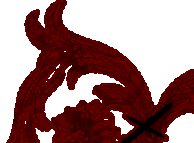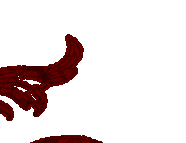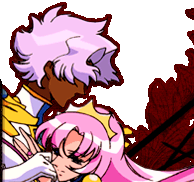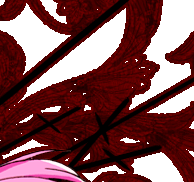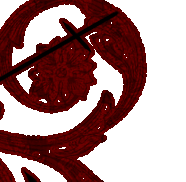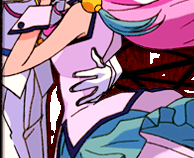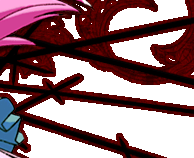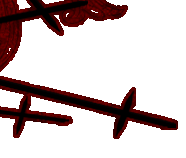
This analysis
was donated by Spiral Artist. 
The series, Shoujo Kakumei Utena (Revolutionary Girl Utena) is an interesting creation. There are dilemmas surrounding it; it is either drenched in symbolism, or is just plain silly; it defies stereotypes, or, it is drenched in stereotypes. However, these dilemmas are not a focus point in this essay. This essay brings about a point of view to the general events occurring throughout the series.
Let us start with the background story which is repeated several times by the Shadow Girls; there once was a girl who was very sad, because her parents had died. One day, as she dwelled in sadness, a handsome prince on a white horse appeared. The prince kissed her tears away, and gave her a ring; promising that the ring would make it so that they could meet again. The girl took the ring, and the promise. But she was so impressed by the prince that she decided to become a prince herself! Despite all the sexual innuendo this holds, it is, in my opinion, a clear representation of what the series are all about; feminism. I do sincerely believe that one of the many things represented throughout is feminism and its ideals.
Starting with the girl (Utena) who decided to become a prince, this is a very strong counter-argument (vis-a-vis the capitalist conception of the situation). Rather than waiting for the prince, she decides to become a prince to save princesses. The prince is a dominant masculine figure; a man that saves the "damsels in distress". The prince also represents the bread-winner, as part of Max Weber's social theories; the one that has power, and quite concordantly, dominance. This capitalist view of the family and society is rebelled against by Utena's first choice; rather than waiting to be saved, she takes matters into her own hands and decides that the "damsel in distress" can very well save herself.
Let us continue by getting into the real story. Utena's parents did die, but the funeral home brought in three coffins instead of two. Utena, in all her despair, decided that she was meant to die as well, and climbed into the coffin. Touga and Saionji found her later on. Utena kept on claiming that she wanted to die, and she would not get out of the coffin, ever. While Saionji insisted they should try to help her, Touga simply walked away, claiming that the choice was hers to make. All the while, Utena repeats a question which gets stuck in Saionji's mind; "What is eternity?". Utena, to climb out of the coffin, wishes to see something eternal. Prince Dios appears shortly afterwards (I am just guessing this part) and asks Utena why she is crying. She summarizes the situation. Then, Dios takes Utena to see Anthy, and her eternal pain, which fuels Utena's desire to save Anthy; even though she does not know who that girl is at the point.
Why is Anthy in pain? Because, she denied the people of Prince Dios' assistance. Dios had to save all their daughters, but he was sick, and therefore, unable to do so. So Anthy refused. And what happened to her was, a thousand swords that shine with the hatred of man pierced her through and through.
How ironic, this fits into the feminism picture of the series very well. Touga's and Saionji's stands are different. Saionji, in that particular situation, represents the masculine part of any patriarchal society, with a biased view that makes him desperately want to save her. Saionji's care for "the girl in the coffin" is clearly overwhelmed by the fact that, saving her would be a demonstration of the power of masculinity. Touga walks away; because Touga takes the feminist part of the argument in that situation. He believes that if she wants to live, she must save herself and not depend on any male figure to do so for her.
Anthy and Dios' situation in the initial background story is no different. Dios represents the decline of masculine power; he is ill, and he cannot save them all. Anthy, then and there, takes the feminist flag and waves it in front of the angry crowd's faces; that even if Dios wasn't sick, it was wrong for him to do all the saving - when clearly, their daughters could have very well saved themselves.
I will briefly stand on the swords, due to the importance of that image; which is used throughout the series. First off, the sword, according to Sigmund Freud, represents the phallus; and with it, power, strength, anger, the desire to overwhelm and to destroy. Secondly and concordantly, it represents masculinity. The initial usage of the sword in the background story, represents the clear reaction of the patriarchal society towards feminism; something to be destroyed, due to its position as a threat against the well-established capitalist social order. I will go through the swords again as I continue.
Let us observe the rules of The Rose Crest. It is just a pretty ring, with a rose emblem on it (a pink rose, which represents "puppy love"). But whoever receives it, has made a contract with The End(s) of The World.
But before the Rose Crest, let me briefly stand on what The End(s) of The World may mean. There are two translations for the term, and two interpretations also. If it is The End of the World, then it stands for the masculine society which ultimately will result in exactly "the end" of "the world"; as Einstein and Nostradamus predicted. If it is The Ends of the World, then it stands for today's social order in itself; since male figures dominate it, they will, eventually, have their "ends" met. This part is also a stab at the Machiavellian statement; "The ends justify the means"; which is perfect for Akio Ohtori's overall schemes - harmful to every side, male of female, but achieving an end most of the time (the finality of the series excluded). This is a brief glance at how the capitalist society functions.
The lives of the duelists (maybe, save for Mikage) prior to the contract are not viewed in detail. Even if some parts are shown, they bear no true importance, and serve to briefly explain the characters' interactions. But, at the end, Akio said that he was "resetting the rules of the Rose Crest"; which means that the contract represents birth - birth into a predetermined social order. And there are two ways out of the Rose Crest; one, is to wait for the end of the "Revolution" duel; and two, is disappearance from society itself, which could be considered as "death".
The contract remains unclear, but it could be said that it depends heavily on dueling. Dueling is a metaphor for how the possession of the ideal female figure (According to today's society) would require a constant battle. The arena is clearly phallic imagery, due to its shape and entrance; and the duels represent the struggle for the success of capitalist social order. Let us continue.
As far as the story fills the blanks, a few chosen duelists battle over the possession of The Rose Bride; Himemiya Anthy. The Rose Bride, though malevolent by nature (I will get to that later), must obey every command of her fianceé. When the letters coming from The End(s) of The World specify the time of the duel, it's on. And finally, when someone successfully is engaged to The Rose Bride, and clears enough duels, the duelist will enter "The Castle Wherein Eternity Dwells" for the final duel of "Revolution". The initial duelists are Touga, Juri, Miki, Saionji (and possibly Ruka). Then, Utena and Nanami join. Mikage and his Black Rose Duelists also interfere during one time. And that's BEFORE Akio takes the matters into his own hands.
Considering the initial duelists, they are all given different kinds of swords, and different colors of roses. These images, both, constitute to a different stand in the "revolutionary struggle." I will, however, only mention the handful few that stand at the center of all; The Student Council Members (excluding Ruka, due to his role being the neutral, like Miki, but less influential), and the late-comers (Utena and Nanami).
Touga's rose is red; which represents love and passion; his sword, initially is a broadsword; which is a symbol for power and dominance (since it requires strength and mastery to wield successfully). Tougua's love and passion are for the one thing he loves; showing off... which later turns towards a love for Utena. This "love" of his, and his final duel with Utena, is Touga's stand - masculine dominance. He wants to protect her, to become "her prince" (see above). But, other than that, it stands for his love of being the "alpha male figure". He cares less about The Rose Bride or the revolution. His sword, on the other hand, represents his power in the Student Council; but also the power he exercises upon half the female population of Ohtori; the power and/or the superiority of physical strength; which is one of the bases of capitalist patriarchy.
There must be a little note here. Touga's act of saving Utena from Saionji is not his contribution to feminism. Quite the opposite, it's his own retaliation and his own betrayal to the same ideal. The system wants to preserve the opposition; so long as the opposition exists, the system may prevail. Because, the system generates opposition; opposition is simply a by-product of a system; and by preserving its status quo, a system can survive. Further proof of this is his statement to Nanami about God's will in the episode, "Nanami's Egg"
Saionji's rose is green, a mid-shade of yellow and cyan (friendship and neutrality); and his sword is a katana. Saionji's rose sums up his position as the desolate one; the "beta male" figure (inferior vis-a-vis Touga) which is not very favored in patriarchy; but not completely rejected either. This is put into display by his interactions with different people; the Student Council members do not respect him, nor like him - but they tolerate his presence. The girls' first choice is always Touga. He's the neglected, weaker part of the society, who struggles, but never achieves. His sword is a katana; a fast-paced sword that emerged from a heavily masculine culture; which is the representation of influence. His desires to become an alpha male are his basic influence. He wants to see something "eternal", so he can show to that girl... he's still there. Further proof of his status as a "beta male" and his confusion about what to be can be seen in the episode, Nanami's Egg.
Miki's rose is blue (neutrality). His sword of choice is a rapier. Miki's rose grants him neutrality; and his overall stance in the series, support this. He is innocent, and in that, he is amoral towards the struggle for dominance between the male and the female; which grants him the choice of not interfering or even caring about it much. His wish to possess The Rose Bride is simply because he sees her as his muse; his inspiration. His desire for art, which is heavily looked down upon by the "alpha male" figures, grants him closure from the struggle, and makes him focus only onto the creative aspect of himself. His sword is a rapier; which can bend easily. Miki's pragmatism is represented in his sword moreso than his skills with a piano, or his Muse, or anything else. His sword can take a shape that he wishes to, and is easy to wield; not too heavy at all. The "basket" shields his hand, so there won't be much damage to his hand either. Miki's pragmatism makes him waver between this and that; neutrally, only seeking benefit. This is most clear in the episode, Sunlit Garden. Also, throughout the series, Miki's neutrality is represented by his acceptance of the concepts, anima and animus (Carl Jung's theory of human bisexuality and "soul mates"); which is what Miki and Kozue are all about - different sides of the same "self".
Juri's rose is orange; a darker shade, and between red and yellow (reverse friendship, reverse love/passion). Her sword of choice is a short sword. Her rose puts her in the position of the feminist confusion; whether lesbianism is compulsory or not (most apparent in her relations to Ruka and Shiori). It also represents the struggle of feminism with both men and women (Ruka and Shiori); the darker side of the society and the struggle. She is the lost part of the feminism; trying to find the self. Her sword, due to the shortness of it, represents the interchangeable roles of a lesbian relationship; but also serves to reflect on how the social mind can fall short in terms of open-mindedness. It serves to show the decline of masculinity (as statistically, more and more "beta males" started to be generated) and the equality of the sexes. Juri's desire to prove that miracles don't exist (by using a miraculous power... strange.) is her realism; something takes time to build and to explode. Every episode centering Juri carries this.
Nanami's rose is yellow (friendship). And her weapons of choice are a curved sword and a dagger of the same quality; with a somewhat Middle-Eastern motif to it. Her rose and her weapons put her to the position of acceptance, giving in. Her position is fixed, and she does not object to that. She knows what her role is, and sticks to it. Her love towards Touga, her jeolousy, and her behavior towards other females that get close to Touga, represent that she is the subordinate figure the capitalist society always dreamed of. The Middle-Eastern quality that I have mentioned earlier serves to give it an Islamic reference, and to represent the oppression of women throughout fundamentalist Islamic countries; and how oppression can increase to that level. Nanami wishes to preserve her brother; the system itself. Further proof can be found on the episode, Nanami's Egg; by her fear of being labeled "a space alien".
Utena's rose is white (innocence). Her choice of a sword, ironically, is the Sword of Dios. Innocence, according to Carl Jung, isn't a representation of "good", but instead, a representation of "the lack of morals"; due to the innocent one not knowing ethics or morals, it represents ignorance towards those, and the destructive power it contains. Utena's destructive power comes from her ignorance towards the ascribed roles of society, and how they piece together the concept of "order". She wears boy's clothes; wields a sword; has ambitions such as becoming a "prince"; and when sleeping, wears pajamas instead of a negligee. And furthermore, she wields the "sword" of a "prince", which means she is, quite clearly, taking up the role of the male in society without even questioning if she should obey her ascribed role or not. Her carrying the sword of the Prince, clearly represents how a female figure will one day represent the male patriarch.
However, a note is well in order. After being defeated by Touga, Utena stops her tomboy attitude. She doesn't wear boy's clothes, she declines from the duels and gives up. She accepts her role in the society. However, this goes against the character of Utena; and the ideal itself. Although endless struggle may be tiring, this incident says, the overall ideal is worth pursuing. After being bitchslapped by Wakaba, Utena returns to her roots. However, it is noteworthy to say that she still fights the duel with a girl's uniform; representing the overall female population of the world (presumably 3, 050 million people). Touga, in that duel, plays dirty, and even asks for The Rose Bride to protect the sword with her soul; for the subordinate servant to fight against this rebellion. In the end, Utena wins; ergo, "persistence has merit."
Mikage's roses, and all his other duelists' roses are black (generally, Death). Mikage's sword does not matter much. However, the colour of his rose, his false memories, his manipulation of all that have been wronged, and his way of choosing duelists with the objective of crowning a man as The Rose Bride ("The Rose Groom"?) all stand for something. The illusion of his past, is connected to the illusion of a fixated society; and Utena is the "death" of that illusion. His duelists are usually selected from women (except for that one time...) who have been wronged, this way or the other. By dwelling into the deepest of their feelings, Mikage makes them worthy to the Black Rose. This is the big picture. It is the presentation of how things can turn the other way so suddenly; rather than dealing with the problem, the duelists (the female figures of today) approach it in a different way, and seek to destroy the opposition towards the current order to maintain it and solve their problems within it. Utena, also becomes the quick answer to this escape from truly solving the problem; but she does not kill any of the Black Rose Duelists; instead, she simply causes the power of the Black Rose (the illusion that the current social order can solve their problems) to wane.
Akio's rose color, or the type of his sword does not matter; because as previously explained, the role of Dios is perfectly clear.
Utena enters the Castle Wherein Eternity Dwells, which is only the observatory. The so-called "eternity" is the observatory due to the fact that the founding fathers of this society (whom Akio's character represents), follow an initially non-interventionist policy towards the order. They only observe. Akio's interventions only serve to create a sudden wave of uprising, and then he retreats and watches as he satisfies the need of his opposition; something to rise against. "Eternity" dwells there, because the current order, has persisted for a long time, and can, therefore, be considered "eternal"..
Akio reveals himself as The Prince, and states that Anthy will remain The Rose Bride, as she was. He claims his sword from Utena; taking her power, and turning her into a princess. This is Utena's final choice; to give up when she is weakened against the male figure, or to continue fighting. This actually is a psychological battle with spritual aspects; every anima looks for an animus and vice-versa. When that void can be filled, will it bear acceptance, or denial?
Utena chooses denial. No matter how bad she may want to complete her own self, she feels the need to go on for the sake of Anthy. It serves to tell that, even though the destruction of patriarchy is necessary, to do it alone as women, is not. For the sake of others, it must be followed; but companionship should not be cancelled.
And then, it's on. The duel named "Revolution" begins. The duel itself is just a summary of all the previous duels; a brief reminder of how much feminism struggled against the masculine order, and now must hold on for the final bit. Although most of the duel goes alongside that line, Akio's words at the beginning of the duel, however, are in a different vein. He says, "This is not game dueling." So, Utena has cleared her way towards all the previous stands (pro and con, neutral and two-faced) and has to face the über-alpha male of the society; THE PRINCE. However, although initially an alpha male "with good intentions", the death of Anthy reduced Dios to an amoral (and ergo, innocent) manipulator. And this is not "game dueling" due to the fact that it is not a small fight against the various manifestations of the social order, but instead, a big fight against the order itself.
Let us briefly stand on The Rose Bride, at this point. Seemingly innocent (I do support the essay titled "Anthy's Malice"), she appears to be the female figure the capitalist society dreams of; the subordinate servant that obeys the commands given, and that's it. The mindless, soulless puppet of whoever is her fiancé. But is The Rose Bride looking for her prince; the man that will save her? This means that, The Rose Bride is the female figure that is at the center of the social order, and with the acceptance of the subordinate position; even in her desire for the prince to come and save her, this is evident. Anthy is the betrayal of the prevalent society. She is the mindset that is imprinted on the activation of the second and third circuits of consciousness (search for Timothy Francis Leary's "Eight Circuit Model of Human Consciousness" for more information; these are the emotional-territorial and semantic circuits), and the settling in of psychological roles belonging to the male and the female. This is the clearest danger towards the feminist ideal; the female emancipation is endangered by the fact that the order itself may retaliate.
Proof?
What did Anthy say when she stabbed Utena, literally, in the back? "You are a girl. You can't be my prince."
Akio walks away, and uses Anthy and the sword to reflect the "1000 Swords" towards Anthy, whose role is to suffer on Akio's behalf as he takes "the key to the Revolution" (the sword) and proceeds to the final rose gate. Then and there, this represents how acceptance will always hurt more than struggle; and how the society itself forces acceptance upon the people inside it from the beginning (mentioned above). The sword however, breaks. The "Revolution" doesn't occur. However, Utena manages to open the gates. And there is Anthy, naked and stripped of all defenses, at full potential, inside. What does all this mean?
It means that, masculinity cannot, in any way, prevent the "revolution". Utena opens the gates, and the revolution ocurrs. She finds the desired female figure; independent, free. When Akio could not have opened it due to his narrow-minded, traditional method of using force, Utena managed to, with her tears; with her strong desire for what is inside Anthy.
Afterwards, we see Akio, working like crazy. "As I presumed, she caused no revolution to occur. I am resetting the rules of The Rose Crest. I am counting on you, Anthy." However, much to his surprise, Anthy declines. Akio, after believing that such thing did not happen, and that the society can prevail as it is, is countered with the perfect and far more superior counter-argument; "She merely vanished from your world. But, by all means, stay in this cozy coffin of yours, and continue to play Prince." Utena simply destroyed the patriarchal grip on society. And the aftermath of this is, quite concordantly, the denial of its existence by the masculine power figures. Utena, however, "vanished from the world of masculine dominance"; which means, a revolution did, in fact, occur. Anthy is the finality; the female figure that the feminist ideal desires. And Akio represents the aftermath denial; he should pretend like the old order still prevails, as it has, throughout centuries. However, Anthy's stand clearly proves that this is simply wishful thinking on the leftover masculine authority figures.
Anthy leaves Ohtori. She is the woman leaving behind the previous order. She is the woman throwing herself into the new, more refined one. She is freedom from ascribed roles.
There's also a noteworthy thing in the ending of the series that combines both Carl Jung's and Timothy Francis Leary's theories. According to Carl Jung, the DNA and the reproductive RNA constitutes to a collectively unconscious mind; which holds the keys to the basic existentialist questions, and is the storage of all memories of mankind. According to Timothy Leary's Eight Circuit Model, the seventh circuit (the neurogenetic circuit) is where the collective unconscious rests. However, while the first four circuits (biosurvival, emotional-territorial, semantic, socio-sexual circuits respectively) are normal, the remaining four (neurosomatic, neuroelectric, neurogenetic, neuroatomic circuits respectively) are extraterrestrial circuits and have to be passed one by one in order. Nobody (save for Akio and Anthy) seem to remember Utena. While the social order has changed, the remembrance of her (the revolution) has been collectively erased from everyone's minds. This is due to the fact that the opening of the sixth circuit (neuroelectric) requires the reprogramming of all previous circuits, thus, canceling the previous versions of the second and third circuits. On the other hand, the inhabitants of Ohtori can recall that there was "someone" there. This is the final circuit that seems possible at this point of history; the seventh one. But, since the seventh circuit consists of evolutionary consciousness (the past and the future), the present time interferes with it, and leaves them only with the remembrance of the revolution, but not specific details; since it carries little to no weight on the current social order.
Thank you for reading this.
 |

